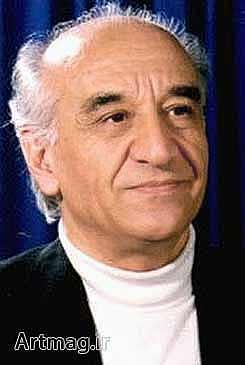
● Birthplace: Tehran
● Died: 9 December 2009 in Tehran
Biography
He was an Iranian musician, a row, composer, lecturer and santour player and Iranian music researcher. He has been one of the most influential of Iranian music figures and the main founding of the hospitality group in Iranian traditional music. His father Ali Payvar, painter artist and master of French language at the University of Tehran and his grandfather Msoraldolah, was the painter of the Qajar period, which was familiar with the play of violin, Santour and Setar. He finished primary and secondary education in high School of Funoon in Tehran. In 1952, he entered the system’s service and became a year later to employ the Ministry of Finance revenue. At the age of 17, he began his music education with Ostad Abolhassan Saba during a six-year learn music row. When Faramarz payvar for learning santour to the classroom of Ostad Abolhassan Saba went to the streets of Zahir ol-Islam, three years passed from the last reformer Sntornoazan of the previous generation, Master Habib Samai. Master Abolhassan Saba, who was a teenager in the course of his adolescence, was with Ali Akbar Shahi and with a variety of techniques with the family of the social media, after a long time and Rose, with Habib Samai, the technique of his best-of-the-former masters of his previous master, so with a lot of great efforts of improvisation He was writing his notes. Then, Master Saba attempted to Braftaden to a number of students from the teaching of the art of the arts near the artistic and aesthetic methods of Iranian music. At the same time, Faramarz Payvar, one of the most prominent disciples of Ostad Saba, and took advantage of his training until the year 1957. After Master Abolhassan Saba’s death, Payvar with masters, such as Abdollah Davmi, Mousa Maroufi, and Nour Ali Khan Boroumand to learn the row of Darvish Khan and the row of Mirza Abdullah paid.
Late Faramarz Payvar, since 1954, began its work in the Ministry of Culture and Art, and since 1958 the Santour training in the high School of National music. He was the first of the improvisation on Santour, and he was not alone in the wake of improvisation. In other words, the first was the song that his specialized instrument was santour. He then taught harmony and cuposision in the great master class of the time, Emanuel Mela. In 1962, he was sent to the United Kingdom by the Ministry of Culture and Art to continue his classical education. The University of Cambridge took the English language and literature. And in all these years, a great effort to introduce Iranian and santour music to academic circles of England did that there are chunky programs of those years in the BBC Radio archives. In these years, at the University of London and Cambridge University, he was asked to introduce conferences in this field with their own instrument. All these conferences were successfully completed and received awards from the universities. Payvar’s return from England was at the beginning of the festival of Shiraz art. Every year, with the group masters and musicians of culture and arts, he was implementing a valuable example of the works of the national music elders as well as his works in these celebrations. Payvar in the year 1968 of the Ministry of Finance was transferred to the Ministry of Education (anti-illiteracy organization) and retired in 1976 years.
The efforts of Faramarz Payvar, a bridge between the legacy of Abolhassan Saba and Morteza Mahjoubi, and the young people’s music and education at the Faculty of Fine Arts, were launched in the early 1971 and became the modern Iranian music model. In the meantime, there were about fifteen years, no one except Faramarz Payvar, a serious and sought-after work in original music. He worked in his group performances with a number of Iranian music elites such as Jalil Shahnaz (TAR) and Houshang Zarif, Rahmatollah Badiee, and Ali Asghar Bahari (fiddle), Hassan Nahid, and Mohammad Mousavi (Ney), Hossein Tehrani, and Mohammad Esmaeili (Tonbak). In decade 1981, along with Jalil Shahnaz, Ali Asghar Bahari, Mohammad Esmaeili, and Mohammad Mousavi, for the other time, the Iranian music masters organized the group and took over the song of the Santour and playing. The group performed the works of persistence with Mohammad Reza Shajarian and Shahram Nazeri. Mohammad Reza Shajarian, the current Iranian vocal master, was Payvar with master at the year 1971 and followed by the learning of santour and vocal rows.
Payvar in personal discipline was a special personality, the ones with whom he had been in and out of Iran in the years and abroad have pointed to his compassion and compassion to the members of the group and his attention and that members do not feel discrimination. This discipline, of course, has been transferred to his students, and some of the most prominent santour musicians are among the students of this name.
Master Faramarz Payvar in the year 1999 had a stroke, and since then until his death, he could not continue his artistic activity. However, in those years, some of his old works were prepared and carried out by the setting of Mehrdad delhospitality and singing Salar Aghili. 2009 He died in Aghdasieh Shahid Bahonar Hospital in Tehran due to cardiac arrest and respiratory problem.
Activities
– Over thousand and five hundred hours of group and individual performances on scenes inside and outside the country
– Track and adjust abundant music pieces
– Educating hundreds of disciples from four consecutive generations
– Notes the abundance of predecessors
– Presence in the conservatory and the atelier of National music, Office of Fine Arts and music unit of Iranian national Television radio
– Writing of Santour books (the second book “Santour recipe” in 1961 after Hossein Saba wrote that the best-selling book of Music Education in Iran)
– Monitor other groups ‘ work and correct them
– Work with many readers such as Abdolvahab Shahidi, Mohammadreza Shajarian, Mahmood Khansari, Ahmad Ebrahimi, Khatereh Parvaneh, Sima Bina, Marzieh, Nader Golchin, Soroush Izadi, Shahram Nazeri, Hamidreza Nourbakhsh and Ali Rostamian and many other readers
Albums
– Concerto for Santour and Orchestra – Common work by Faramarz Payvar and Hossein Dehlavi – Singing by Abdolvahab Shahidi
– Goodbye Goodbye – Abdolvahab Shahidi, Faramarz Payvar, Parviz Yahaghi and Jahangir Malek
– Your warm look (life) – Abdolvahab Shahidi, Faramarz Payvar, Hassan Nahid, Houshang Zarif, Rahmatollah Badiei, Mohammad Ismaili
– It can’t be done without you – Abdolvahab Shahidi, Parviz Yahaghi, Faramarz Payvar, Jahangir Malek and other artists
– Performed by Abdolvahab Shahidi and Orchestra of National Instruments and Faramarz Payvar – Video Music Collection in Segah Gah
– Solo Selected – Iranian Music Teachers Group led by Faramarz Payvar, Singer: Mohammad Reza Shajarian
– The Secret of the Heart – The Blood of the Homeland Youth – Payvar Group, led by Faramarz Payvar Singer: Mohammad Reza Shajarian
– Entezar Del – A group of Iranian music masters led by Faramarz Payvar Singer: Mohammad Reza Shajarian
– Yousef Gomgooshteh – Payvar Group led by Faramarz Payvar Singer: Mohammad Reza Shajarian
– Del Sheyda – Pivar Orchestra, Isfahan Song, Singer: Shahram Nazeri
– Concert of Iranian Music Teachers – Iranian Music Teachers Group, Abu Atta Singing, Singer: Shahram Nazeri
– Lily and Majnoon – Payvar Group, Shoor Machine, Singer: Shahram Nazeri
– After half a century of artistic activity of Faramarz Payvar – Singing by Abdolvahab Shahidi, Mohammad Reza Shajarian, Shahram Nazeri, Ismail Adib Khansari and Mahmoud Karimi
– Santour Grammar Educational Album – Master Faramarz Payvar
– Thirty pieces of Chahar Zarab – Master Faramarz Payvar
– Shahrnaz – Faramarz Payvar, Hossein Tehrani
– Parnian – Faramarz Payvar
– Zarabahang – Faramarz Payvar, Hossein Tehrani
– Shahr Ashob – Faramarz Payvar, Hossein Tehrani
– Delnavaz – Faramarz Payvar, Hossein Tehrani
– Karshmeh – Performing Darvishkhan works with orchestra
– Parizad – Performing Darvish Khan works with orchestra
– Delkesh – Performing Darvishkhan’s works with orchestra
– Mahour and Sehgah device – Faramarz Payvar, Houshang Zarif and Mohammad Ismaili
– Songs in Shoor and Mahour – Payvar Orchestra
– Shoor, Chahargah, in memory of Habib Samaei – Faramarz Payvar
– Homayoun device – Faramarz Payvar, Mohammad Ismaili
– Rahavard – Faramarz Payvar, Jalil Shahnaz, Mohammad Ismaili
– Chaharbagh – A group of masters led by Faramarz Payvar, Singer: Ali Rostamian
– Multiplication of principles – Faramarz Payvar, Hossein Tehrani
– The result of life – Payvar, Bahari, Tehrani
– The Story of the Heart – Payvar Group, Singer: Ali Rostamian
– Scattered – Faramarz Payvar, Mohammad Ismaili – This album is also released under the name: Under the Rain and Outside Iran.
– Arghavan – Payvar Group, Singer: Ali Rostamian
– Moonlight Night – A collection of songs sung by Ali Rostamian with the Payvar group.
– The sound of the heart
– Nova Improvisation, Right Panjgah – Faramarz Payvar
– Ring of Chaos City – Faramarz Payvar
– Conversation – Double playing set for dulcimer and various instruments
– The Curtain of Lovers – Payvar Group, Singer: Hamidreza Nourbakhsh
– Soroush Bahar – Made by Master Faramarz Payvar, Singer: Bahram Bajlan
– Moyeh – Delnavazi group in collaboration with Faramarz Payvar, Jalil Shahnaz, Mohammad Mousavi
– Karshmeh Narges – Faramarz Payvar, Jalil Shahnaz, Mohammad Ismaili, Singer: Siamak Shajarian
– Seven bodies
– Mahmoud Karimi’s song – Santour: Faramarz Payvar, Setar: Dariush Safvat
– Only one memory – Faramarz Payvar and Mohammad Reza Lotfi
– Ayaran – Performance of works by Ahmad Pejman by the National Instruments Ensemble
– Excerpts from old masters of Iran – National Instruments Ensemble, Arranger and Head of Ensemble: Master Faramarz Payvar
– Master’s Symphony – Performed by Payvar Group – Published in 2012
– A number of Golha programs, in collaboration with Master Faramarz Payvar: No. 103, 107, 123, 124, 133, 137, 150, 156, 158, 162, 181, 182, 183, 185, 102
Compilations
1940 – Santour Order
1972 – Thirty-four quatrains for Santour
1978 – Eight songs for Santour
1979 – Parnian – A duet for strings and dulcimer
1979 – Conversation – Double playing for violin and dulcimer
1980 – Row (left) for Santour
1980 – Preface and Color Collection – for Santour
1982 – Pre-collection and color collection – for violin
1982 – Parts of Majlisi Music
1982 – Lantern
1983 – Music Theory
1984 – Rang Shahr Ashob
1988 – Elementary school
1989 – Passer-by – A duet for santur and flute
1994 – Tar Elementary Education
1996 – A line of old songs and poems narrated by Master Abdullah Davami
1999 – Re-editing of Abolhassan Saba’s Santour Rows – Rewritten by Pejman Azarmina
2000 – Falgoosh – Seven pieces for Santour
2004 – Forty pieces for Santour – Preface, Color, Chahar Zarab by the old masters of Iran – Compiled and arranged by Faramarz Payvar and compiled by Mina Oftadeh
2011 – Master Abolhassan Saba’s Row for Left Cock Santour, by Faramarz Payvar, – Transfer to Left Cook and edited by: Mina Oftadeh – The original version of this book was written by Ms. Oftadeh and prepared under the supervision of Master Payvar



